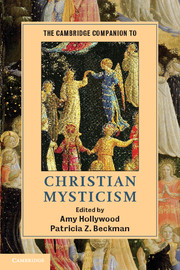Book contents
- Frontmatter
- Contents
- Contributors
- Introduction
- Part I Contexts
- Part II Key Terms
- 5 Apophatic and Cataphatic Theology
- 6 Lectio Divina
- 7 Meditatio/Meditation
- 8 Oratio/Prayer
- 9 Visio/Vision
- 10 Raptus/Rapture
- 11 Unio Mystica/Mystical Union
- 12 Actio et Contemplatio/Action and Contemplation
- Part III Contemporary Questions
- Select Bibliography of Christian Mystical Texts up to around 1750
- Select Bibliography of Modern Works Related to the Study of Western Christian Mysticism
- Author and Artist Index
- General Index
- References
5 - Apophatic and Cataphatic Theology
from Part II - Key Terms
Published online by Cambridge University Press: 05 December 2012
- Frontmatter
- Contents
- Contributors
- Introduction
- Part I Contexts
- Part II Key Terms
- 5 Apophatic and Cataphatic Theology
- 6 Lectio Divina
- 7 Meditatio/Meditation
- 8 Oratio/Prayer
- 9 Visio/Vision
- 10 Raptus/Rapture
- 11 Unio Mystica/Mystical Union
- 12 Actio et Contemplatio/Action and Contemplation
- Part III Contemporary Questions
- Select Bibliography of Christian Mystical Texts up to around 1750
- Select Bibliography of Modern Works Related to the Study of Western Christian Mysticism
- Author and Artist Index
- General Index
- References
Summary
The terminology of “apophatic” and “cataphatic” theologies, that is, the use of negation (apophasis) and affirmation (kataphasis) in our ways of talking about God, was introduced into Christian theology by the probably early-sixth-century author who wrote under the pseudonym of the Apostle Paul’s convert, Dionysius the Areopagite (generally referred to as Pseudo-Dionysius). It was, however, only terminology that Dionysius introduced; the use of negation and affirmation in relation to God had a long history, longer even than Christianity, reaching back into the traditions of the Hebrew scriptures and classical Greek philosophy to which Christian theology had early laid claim. Human beings have always affirmed something of God, either as a result of speculation about the divine or as an affirmation of revelation about God – the Hebrew scriptures contain records claiming to be God’s self-revelation, and followers of other religious traditions have both claimed similar revelations and celebrated the divine in hymnic aretalogies, that is, lists of divine virtues. But this affirmation of the divine has always been hedged about by a sense of the mysteriousness of the divine, leading to the negating of any affirmations about God, thereby bearing testimony to the inadequacy of any human conception of God. So a Hebrew prophet exclaims in God’s name, “To whom then will you compare me, that I should be like him? says the Holy One” (Is 40:25) and even the revelation of God’s name to Moses – “I am that I am” (Ex 3:14) – is an affirmation about God inviting or even requiring an apophatic interpretation. Similarly, within the Greek philosophical tradition, we find Plato asserting in the Timaeus that “to discover the Father and Maker of the universe would be some task, and it would be impossible to declare what one had found to everyone” and in The Republic that the Idea of the Good, for Plato the highest reality, is “beyond being.”
- Type
- Chapter
- Information
- The Cambridge Companion to Christian Mysticism , pp. 137 - 146Publisher: Cambridge University PressPrint publication year: 2012
References
- 8
- Cited by



